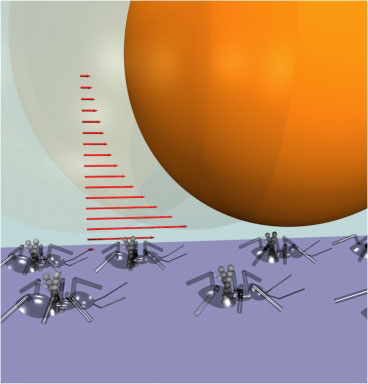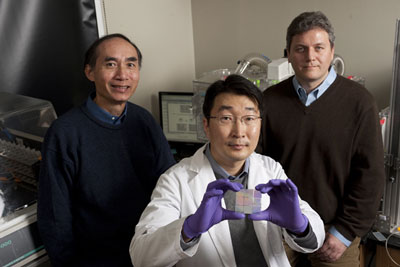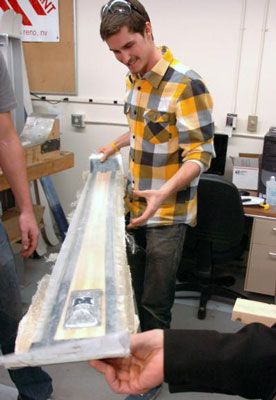The S$50 million jointly funded centre by Nanyang Technological University (NTU) and EDB named VIRTUS (Latin for 'excellence'), aims to be a world-class IC design house, developing key technologies required to design integrated circuits and systems for applications in medical technology, clean technology and consumer electronics.
Dec 15th, 2009
Read more
FIRST (For Inspiration and Recognition of Science and Technology), a not-for-profit organization founded by inventor Dean Kamen to inspire young people's interest and participation in science and technology and the Massachusetts Institute of Technology (MIT) today announced a global strategic alliance and a U.S. pilot program to promote the importance of science, technology, engineering and math (STEM) in K-12 education.
Dec 14th, 2009
Read more
 A new microscopic system devised by researchers in MIT's department of materials science and engineering, in collaboration with researchers in Germany and Boston University, could provide a novel method for moving tiny objects inside a microchip, and could also provide new insights into how cells and other objects are transported around within the body.
A new microscopic system devised by researchers in MIT's department of materials science and engineering, in collaboration with researchers in Germany and Boston University, could provide a novel method for moving tiny objects inside a microchip, and could also provide new insights into how cells and other objects are transported around within the body.
Dec 14th, 2009
Read more
University of Toronto quantum optics researchers Sajeev John and Xun Ma have discovered new behaviours of light within photonic crystals that could lead to faster optical information processing and compact computers that don't overheat.
Dec 14th, 2009
Read more
Tiny nanoprobes have shown to be effective in delivering cancer drugs more directly to tumor cells - mitigating the damage to nearby healthy cells - and Purdue University research has shown that the nanoprobes are getting the drugs to right cellular compartments.
Dec 14th, 2009
Read more
Joint CNSE-EYP initiative also includes launch of Alternative Energy Test Farm and development of the 'NanoIDEA' workforce training program with seed funding from NYSERDA.
Dec 14th, 2009
Read more
Scientists have identified a novel antifreeze molecule in a freeze-tolerant Alaska beetle able to survive temperatures below minus 100 degrees Fahrenheit. Unlike all previously described biological antifreezes that contain protein, this new molecule, called xylomannan, has little or no protein.
Dec 14th, 2009
Read more
Researchers at Rice University and Baylor College of Medicine (BCM) have created a single nanoparticle that can be tracked in real time with MRI as it homes in on cancer cells, tags them with a fluorescent dye and kills them with heat.
Dec 14th, 2009
Read more
Binden Antikoerper des Immunsystems an Proteine, koennen sie deren Form - und damit auch die Funktion dieser Molekuele - veraendern. Einem LMU-Team gelang hier nun ein Durchbruch: Die Forscher konnten zeigen, dass unkonventionell kleine Antikoerper, die sogenannten Nanobodies, die Eigenschaften des Gruen Fluoreszierenden Proteins, kurz GFP, mit unerwarteter Praezision modifizieren.
Dec 14th, 2009
Read more
The French government will invest 35 billion euros (51.3 billion dollars) to make France more competitive and better prepared for the future, President Nicolas Sarkozy said Monday.
Dec 14th, 2009
Read more
A spectroscope with unrivalled performance, able to identify tiny amounts of trace gases in real time, has been developed by researchers from CNRS's Molecular Photophysics Institute and the Max Planck Institute of Quantum Optics (Germany), within the framework of the European Laboratory for Frequency Comb Spectroscopy.
Dec 14th, 2009
Read more
 Johns Hopkins biomedical engineers, working with colleagues in Korea, have produced a laboratory chip with nanoscopic grooves and ridges capable of growing cardiac tissue that more closely resembles natural heart muscle. Surprisingly, heart cells cultured in this way used a 'nanosense' to collect instructions for growth and function solely from the physical patterns on the nanotextured chip and did not require any special chemical cues to steer the tissue development in distinct ways.
Johns Hopkins biomedical engineers, working with colleagues in Korea, have produced a laboratory chip with nanoscopic grooves and ridges capable of growing cardiac tissue that more closely resembles natural heart muscle. Surprisingly, heart cells cultured in this way used a 'nanosense' to collect instructions for growth and function solely from the physical patterns on the nanotextured chip and did not require any special chemical cues to steer the tissue development in distinct ways.
Dec 14th, 2009
Read more
 Nanotechnology seems a daunting subject, but for mechanical engineering students at the University of Nevada, Reno, it has taken on a real world approach - in Ski Building 101.
Nanotechnology seems a daunting subject, but for mechanical engineering students at the University of Nevada, Reno, it has taken on a real world approach - in Ski Building 101.
Dec 14th, 2009
Read more
In future, it will be possible to quickly analyse DNA from pathogenic bacteria via an online so-lution which at same time collects and shows information on species, strains and antimicrobial resistance on web-based world maps. This can contribute to reduce and prevent the global spread of contagious diseases. These are among the perspectives behind the Centre for Molecular Epidemiology which can now be established at Technical University of Denmark.
Dec 14th, 2009
Read more
Senior policymakers and experts in the defense and cleantech industries got a boost today with the announced formation of the NanoAssociation for Natural Resources and Energy Security (NANRES). NANRES is a trade organization designed to advance the research, development, and commercialization of innovative energy and environmental-specific nanotechnologies.
Dec 14th, 2009
Read more
In its series on the safety of manufactured nanomaterials, the OECD has published 'Analysis of Information Gathering Initiatives on Manufactured Nanomaterials'.
Dec 14th, 2009
Read more




 Subscribe to our Nanotechnology News feed
Subscribe to our Nanotechnology News feed